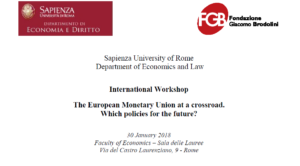[:en]

Sapienza University of Rome
Department of Economics and Law
Fondazione Giacomo Brodolini
International Workshop
“THE EUROPEAN MONETARY UNION AT A CROSSROAD. WHICH POLICIES FOR THE FUTURE?”
30 January 2018
Faculty of Economics – Sala delle Lauree
Via del Castro Laurenziano, 9 – Rome
The current crisis is the culmination of a process of integration that has profoundly changed the structure of each member state, their interrelations and their power relations. Several explanations have been advanced, focusing on institutional flaws, macroeconomic imbalances and inadequate economic policies.
The workshop starts from the conviction that in our endeavour to respond to the current crisis we must look beyond the short run, analysing the different trajectories of the peripheral and core countries in terms of the interdependence between economies with different productive capabilities. After decades of economic integration and EU enlargement, the economic geography of Europe has shifted, with new peripheries emerging and the core showing signs of fragmentation. Divergence has been increasing in many domains, with weaker member states and regions falling behind their stronger companions. Moreover, economic and social inequality is on the rise within each of the member states.
The workshop offers an opportunity for discussion between academics and policymakers interested in the past, present and future construction of Europe. Offering a fresh angle on the European crisis, it intends to build a bridge between macro, micro and policy analyses, with a focus on countries’ diverse productive capabilities and their interdependence. We will be investigating which macroeconomic and industrial policies are required to ensure the long-term sustainability of the monetary union and, in particular, what is the role of the state in guiding investment, diversifying, innovating and strengthening the economic structures of peripheral countries to help them thrive.
PROGRAMME
9.30 – 9.45
Fabrizio D’Ascenzo – Dean of the Faculty of Economics
Silvia Fedeli – Dean of the Department of Economics and Law
10.00 – 10.30
Annamaria Simonazzi – Sapienza University of Rome and Fondazione G. Brodolini
Presentation of the main contents of the book “Crisis in the European Monetary Union: A Core-Periphery Perspective” by Giuseppe Celi, Andrea Ginzburg, Dario Guarascio and Annamaria Simonazzi – Routledge, 2018.
Morning Session
Chair: Dario Guarascio – National Institute for Public Policy Analysis
10.30-11.00
Michael Landesmann – Vienna Institute for International Economic Studies, University of Linz and Accademia dei Lincei
11.00 – 11.30
Bruno Amable – Universitè de Geneve
11.30 – 12.00
Maurizio Franzini – Sapienza University of Rome
12.00 – 13.00
Discussion
Lunch break
Afternoon Session
Chair: Giuseppe Celi – University of Foggia
14.00 – 15.30
Institutions and Economic Governance in Europe
Elena Paparella – Sapienza University of Rome
Stefano Sacchi – President of the National Institute for Public Policy Analysis
Giorgio Fodor – University of Trento
15.30-17.00
Macroeconomic and industrial policies
Antonella Stirati – Roma Tre University
Roberto Tamborini – University of Trento
Mario Pianta – Roma Tre University
Giovanni Solinas – University of Modena and Reggio Emilia
17.00 – 17.30 Discussion
[:it]
Sapienza University of Rome
Department of Economics and Law
Fondazione Giacomo Brodolini
International Workshop
“THE EUROPEAN MONETARY UNION AT A CROSSROAD. WHICH POLICIES FOR THE FUTURE?”
30 January 2018
Faculty of Economics – Sala delle Lauree
Via del Castro Laurenziano, 9 – Rome
The current crisis is the culmination of a process of integration that has profoundly changed the structure of each member state, their interrelations and their power relations. Several explanations have been advanced, focusing on institutional flaws, macroeconomic imbalances and inadequate economic policies.
The workshop starts from the conviction that in our endeavour to respond to the current crisis we must look beyond the short run, analysing the different trajectories of the peripheral and core countries in terms of the interdependence between economies with different productive capabilities. After decades of economic integration and EU enlargement, the economic geography of Europe has shifted, with new peripheries emerging and the core showing signs of fragmentation. Divergence has been increasing in many domains, with weaker member states and regions falling behind their stronger companions. Moreover, economic and social inequality is on the rise within each of the member states.
The workshop offers an opportunity for discussion between academics and policymakers interested in the past, present and future construction of Europe. Offering a fresh angle on the European crisis, it intends to build a bridge between macro, micro and policy analyses, with a focus on countries’ diverse productive capabilities and their interdependence. We will be investigating which macroeconomic and industrial policies are required to ensure the long-term sustainability of the monetary union and, in particular, what is the role of the state in guiding investment, diversifying, innovating and strengthening the economic structures of peripheral countries to help them thrive.
PROGRAMME
9.30 – 9.45
Fabrizio D’Ascenzo – Dean of the Faculty of Economics
Silvia Fedeli – Dean of the Department of Economics and Law
10.00 – 10.30
Annamaria Simonazzi – Sapienza University of Rome and Fondazione G. Brodolini
Presentation of the main contents of the book “Crisis in the European Monetary Union: A Core-Periphery Perspective” by Giuseppe Celi, Andrea Ginzburg, Dario Guarascio and Annamaria Simonazzi – Routledge, 2018.
Morning Session
Chair: Dario Guarascio – National Institute for Public Policy Analysis
10.30-11.00
Michael Landesmann – Vienna Institute for International Economic Studies, University of Linz and Accademia dei Lincei
11.00 – 11.30
Bruno Amable – Universitè de Geneve
11.30 – 12.00
Maurizio Franzini – Sapienza University of Rome
12.00 – 13.00
Discussion
Lunch break
Afternoon Session
Chair: Giuseppe Celi – University of Foggia
14.00 – 15.30
Institutions and Economic Governance in Europe
Elena Paparella – Sapienza University of Rome
Stefano Sacchi – President of the National Institute for Public Policy Analysis
Giorgio Fodor – University of Trento
15.30-17.00
Macroeconomic and industrial policies
Antonella Stirati – Roma Tre University
Roberto Tamborini – University of Trento
Mario Pianta – Roma Tre University
Giovanni Solinas – University of Modena and Reggio Emilia
17.00 – 17.30 Discussion[:]
